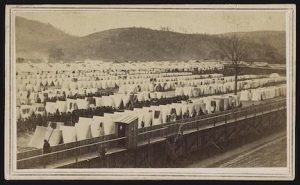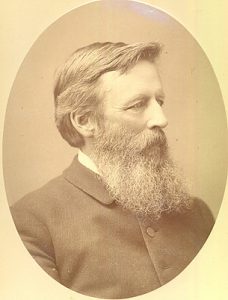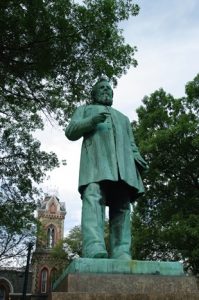A Beecher ventures to Corning

Elmira can be an unforgiving, frigid place to spend time – even if you are well clothed and sheltered. For a Confederate soldier from the deep South suddenly transported to the prisoner of war camp there it could be a trial like no other. As prisoner John King recalled, Elmira was a “pleasant summer prison for the Southern soldiers, but an excellent place for them to find their graves in the winter.” To meet the challenges and suffering of incarceration, men reacted according to their natures – some wallowed in despair, others hunted rats, but many turned to their faiths.[i]
From the earliest days of the POW camp, religious services were offered the butternut ragamuffins who dwelt there. The enthusiastic response of local clergymen to Eastman’s suggestion that they come and preach to the multitude was probably gratifying, but not all believed their motivations were pure. Anthony Keiley, a Virginia legislator and brief resident of the Elmira camp, observed that “the abolitionist editor in Elmira complained very bitterly of the alacrity with which the clerical gentlemen accepted the proposal, and intimated that it was due to their curiosity, not their zeal.”
In general, the population of prisoners in Elmira was of a religious-mind. Early on it was observed that “there are 1,511 prisoners who profess religion, 547 Baptists, 542 Methodists, 110 Presbyterians, and 242 Roman Catholics.” But whatever the sect of the preacher in attendance on any occasion, the turnout was usually large and folks in the surrounding city would comment on the pleasant sensation occasioned by hearing thousands take up hymns.

Perhaps the most popular minister of the gospel in New York’s Southern Tier was the Rev. Thomas Beecher. Born in Litchfield, Connecticut, Beecher was from a distinguished family. Educated in Ohio and Indiana, Thomas Beecher studied theology and Chemistry before moving to Elmira in 1854.
During the war Beecher was instrumental in recruiting local regiments and served in the field as Chaplain of the 141st New York Volunteer Infantry. Among the first to embrace the opportunity to cultivate souls inside the camp, Beecher befriended Commandant Henry Colt and became a respected advisor. After the war Beecher became close friends with Samuel Clemens, AKA Mark Twain, and even performed the ceremony when he married Olivia Langdon in 1870.
While working on something entirely different recently, I stumbled across a fascinating account of Beecher’s November 1868 visit to nearby Corning, NY where he was filling in for another pastor.
Rev. Thomas BEECHER, of
Elmira, preached in the Presbyterian
Church, in this village, last Sunday
morning and evening, having exchanged
with Rev. Dr. NiIes. It
was not generally known in the morning,
and there was an average attendance.
In the evening there were
many present, who were attracted by
the desire to hear this distinguished
preacher, teacher and “politician.”
His sermons were quite able and gave
great satisfaction to many, while others
were disposed to criticise severely
his Illustrations and perhaps his theology.
He is apt to speak without
precision and thus does not guard
against possible misapprehension. He
is singular in his views, and seems to
study excentrlcity In thought and action.
This we deem a mistake for
any one. Probably it has become
second nature with Mr, B., or It may
be that he cannot help it, as a member
of the Beecher family. He has his
Mission and is fulfilling it. He has
done, and is doing much to show that
religion is a privilege as well as a
duty—that correct belief is desirable
but not essential—that orthodoxy is
of small account unless vivified by an
active love to God and man. We do
not “believe in Beecher” particularly,
yet we regard him AS a man who is
exerting a profound influence for good,
taking the world as he finds it, striving
to make it better by deeds rather than
words; by charity rather than intolerance;
by appealing to the reason rather
than the fears of men, so that not
as Slaves but as Children men shall be
led to obey the precepts of the Bible,
and rejoice In the Gospel, as the “good
tidings of great Joy which shall be to
all people.”[ii]

I was first struck by the line suggesting Beecher was a “distinguished preacher, teacher and “politician.” This, no doubt, is commentary on the reverend’s famously liberal views, which were popular in Elmira at the time but not so outside that community. The Park Church, which Beecher helped to establish, had been founded by a progressive group of citizens who explicitly wanted an anti-slavery institution and broke from the Presbyterian Church.
It is also possible that Beecher’s family and its extensive reputation had much to do with the way that the Elmira pastor was viewed. He “seems to study eccentricity in thought and action,” the Corning editors lamented before saying essentially, well what do you expect – he is a Beecher.
Son of Connecticut cleric Rev. Lyman Beecher – a famously anti-Catholic pastor who would lead the early Temperance movement – Thomas was one of thirteen children who included Rev. Henry Ward Beecher and Harriet Beecher Stowe. Perhaps the most famous – or maybe infamous – of the Beecher clan, Henry Ward was a lightning rod for controversy. A talented orator, the activist pastor championed social reforms of all shapes and sizes from Temperance to the abolition of slavery to women’s suffrage. But the Brooklyn cleric attracted plenty of attention for his rumored adultery – which will result later in an adultery trial – and for purchasing guns which he sent to Kansas before the Civil War. These he styled “Beecher Bibles.” His habit of employing mimicry, satire and sarcasm in his public addresses also earned Henry Ward a fair share of critics.

Almost as famous, without the narcissistic flair of her brother, was Thomas’s sister Harriet Beecher Stowe. Educated at the Hartford Female Seminary and author of over thirty books, Stowe was a remarkable woman from a remarkable family. Her great claim to fame, of course, was the 1852 book Uncle Tom’s Cabin. Like much of her family, Stowe was strongly against slavery and believed that a woman’s voice was needed in the debate. Prior to and during the Civil War Stowe was a frequent visitor to Elmira over the summer season.
While it is clear that the Corning folks are not big fans of Thomas Beecher – as they say they do not “believe in Beecher,” they nonetheless show a grudging respect for his approach to Christianity. Not boastful, like his brother Henry Ward, Beecher was an “influence for good…striving to make it better by deeds rather than words; by charity rather than intolerance; by appealing to the reason rather than the fears of men.”
Sources:
[i] Portions of the text in this post are from my recent book HELLMIRA: The Union’s Most Infamous Civil War Prison Camp – Elmira, NY (Savas Beatie, 2020).
[ii] Corning Gazette, Nov. 26, 1868.
Perhaps we all ought to practice Beecher’s comment about influencing for the good… by deeds rather than just words…by charity (generosity, love, kindness) rather than intolerance… and by appealing to reason rather than the fears of men.
It is timely and appropriate for people of all faiths and all political parties.
Just finished Harriet Beecher Stowe’s extensive autobiography. I was saddened that after reading over one thousand pages, there was no mention of Elmira or the Park Church.